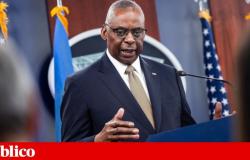The idea of a “colonialist” West, determined to create “division”, has always been present in Vladimir Putin’s presentations, but this time, the risk of nuclear war was brandished like a flag in front of those who listened to him. In Parliament, in the annual state of the nation address, the Russian President promised that Russia will react and “defeat” NATO on its own territory if there is a “threat of expansion” that triggers a nuclear war. These are statements that come after Macron refused to rule out the possibility of placing troops on Ukrainian territory. The French President admitted, however, that there was no understanding regarding such movements, after the conference of 20 leaders – mainly European – in Paris. “There is no consensus to officially support the advance of any ground troops. That being said, nothing should be excluded. We will do everything we can to ensure that Russia does not prevail.”
Putin reacted, despite the impasse: “They are preparing to attack our territory, and they want to use the best possible forces, the most effective, to do so. But we remember the fate of those who tried to invade our territory, and, of course, their fate will be far more tragic than anything we can face.” The threat could not be clearer, with the President of the Russian Federation resorting to his heaviest arsenal. “They have to understand that we also have weapons. Weapons that can defeat them on their own territory and, of course, all of this is very dangerous, because it could actually trigger the use of nuclear weapons. Don’t they understand this?”
Ignoring Europe’s warmongering past (which has already been at the center of two world wars), the Russian leader continued: “These are people who have not gone through arduous experiences, but we survived the war in the Caucasus, for example, and now the conflict in Ukraine .”
“It is very unlikely that NATO will send troops to Ukraine, as this could be the move that starts a wider war”, Walter Dorn, professor of Defense Studies at the Canadian Forces College, in Toronto, explained to Expresso. “The West – especially the US – has been very careful to avoid direct war with Russia.” In this sense, Macron’s comments will have served “to give Ukraine more power at the negotiating table, once the talks begin”, maintains the analyst. “Putin’s threats regarding a broader conflict are also a theatrics. Putin would lose the war in Ukraine if the West intervened directly and supplied his troops. Some countries, such as Poland and the Baltic countries, feel a direct threat from Russia.” Therefore, they would be most interested in ensuring that Russia loses in Ukraine.
But the United States exerts inescapable influence in the context of NATO, and has been emphatic in stating that it will not send any troops to Ukraine. “As far as we know, they didn’t even send small groups of observers,” points out Mark Cancian, former advisor to the US Department of Defense and now advisor to the Center for Strategic and International Studies, a think tank in Washington. “It is known that other NATO countries, such as the United Kingdom, have sent small groups of observers and advisors. Some countries, like France, have threatened to send troops, but these are demonstrations of power. There is no likelihood of NATO sending combat forces to Ukraine, because that would mean engaging in combat with Russia and starting the bigger war that everyone is trying to avoid. NATO troops in Ukraine are also one of the Russian red lines for which they could use nuclear weapons. The other is a land invasion of the Russian homeland.”
Emmanuel Macron managed, however, to change the debate within the Alliance on how to support Ukraine. “It helped change the narrative around Ukraine’s own forces, which have had setbacks of late, and possibly served to distract attention from their changing stance on purchasing equipment within – or outside – Europe,” recalls William Alberque, director of Strategy, Technology and Arms Control at the International Institute for Strategic Studies, in Berlin. (The French President now says that the suppression of Ukraine’s artillery needs can be ensured by using EU money but buying material outside the bloc.)
At this moment, it is even likely, according to Alberque, that there are several foreign advisors on Ukrainian territory, even if the introduction of troops is unlikely. However, that possibility changes the terms of the debate. “If Ukraine were truly at risk of collapse, it would be possible to insert foreign forces to protect civilians and challenge Russia to attack them in order to end the conflict. But even that scenario is currently very unlikely.”
For Putin, hinting at this possibility was enough for him to once again argue that the West is trying to “destroy” Russia and restrict its development. “The so-called West, with its very colonialist tendencies, is trying not only to contain our development, but also intends to destroy us and use our space for whatever its purposes, including Ukraine. They are absolutely determined to drive division among us and weaken us.”
O website “Politico” talks about Putin’s plan for the next six years (the period during which the Russian President will still govern, after the March elections): “continue fighting, stop drinking and have babies”. In his two-hour speech, Vladimir Putin not only demonstrated a commitment to continuing the war in Ukraine, but also promised that life in 2030 would be better for everyone in the country. “We see what is happening in some countries, where moral norms and family institutions are being deliberately destroyed, pushing entire peoples towards extinction and degeneration. We choose life.” The Russian leader called on citizens to “stop drinking” and engage in activities that increase life expectancy and birth rates in Russia.
The United Kingdom criticized Olaf Scholz for claiming that the British and French are helping Ukraine in the “management and control of targets” to be hit by cruise missiles. The German Chancellor’s accusation is “wrong, irresponsible and a slap in the face of the allies”, responded the chair of the UK Parliament’s Foreign Affairs Committee, Alicia Kearns. In Berlin earlier this week, Scholz justified his continued refusal to send long-range cruise missiles (Taurus) to Ukraine by saying that this could lead to German troops in Ukraine having to program them, thus making Germany a participant. active in the conflict.
Other news to highlight:
⇒ European Defense and Foreign Ministers will meet in Paris in the coming days to discuss Ukraine and Moldova. The information was provided by a spokesperson for the French Ministry of Foreign Affairs this Thursday. The responsible Pro-Russian separatists from the Moldovan separatist region of Transnistria asked Moscow for “protection” on Wednesday. The representatives asked the Federation Council and the Russian Duma (Parliament) to “implement measures to protect Transnistria in the face of growing pressure from Moldova”. At the end of last week, the Institute for the Study of War (ISW) published a warning about the possibility that this region, in eastern Moldova, could ask to be officially annexed to Russia. “The pro-Russian separatist region of Transnistria may call or organize a referendum on the annexation of Transnistria to Russia at the recently announced Transnistrian Congress of Deputies, scheduled for February 28.” The Transnistria region is located east of Moldova, next to southeastern Ukraine. The Russian military presence has been maintained since 1992. (You can read more about this topic here It is here.) Transnistria was a topic ignored by Putin in his big annual speech held this Thursday.
⇒ The Ukrainian Armed Forces claim to have shot down three more Russian Su-34 fighters. On Telegram, military leader Oleksandr Syrskyi referred to the new successes against the Moscow Air Force. “After successful combat operations against an enemy aircraft on the night of February 29, two more Russian aircraft were destroyed: Su-34 fighters in the Avdiivka and Mariupol sectors.” The Ukrainian military had said last week that Russia had lost six warplanes in three days.
⇒ Ukraine has identified 511 people suspected of war crimes since the start of the Russian invasion in February 2022. 81 convictions have already been handed down, also according to the Kiev prosecutor general. Andriy Kostin was speaking during a press conference on war crimes, together with prosecutors from Poland, Lithuania, Romania and the president of the EU justice organization Eurojust. The advances made by the Joint Investigative Team, an initiative that brings together five European Union countries to investigate war crimes in Ukraine, were announced. The president of Eurojust, Ladislav Harman, said it was the “largest war crimes investigation in history”.
Tags: United Kingdom France Germany odds Putin raises nuclear threat news marked #736th day war
--




